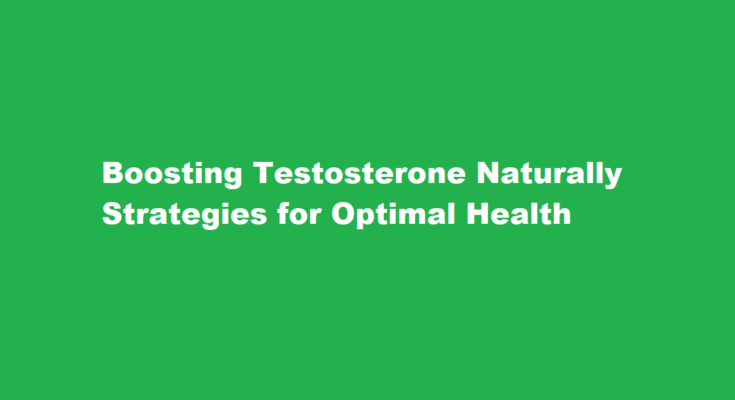Introduction
Testosterone is a crucial hormone in the male body, responsible for various functions such as muscle growth, bone density, libido, and overall vitality. However, both men and women need optimal testosterone levels for their well-being. While there are medical interventions available for individuals with clinically low testosterone, many people can enhance their testosterone levels naturally through lifestyle changes and healthier habits. In this article, we will explore some effective strategies to boost testosterone naturally.
Maintain a Healthy Diet
Diet plays a pivotal role in regulating hormone levels, including testosterone. Incorporating the following dietary choices can help optimize testosterone production
a. Protein-Rich Foods: Protein is essential for muscle growth and repair. Sources like lean meats, fish, eggs, and dairy products provide essential amino acids required for testosterone production.
b. Healthy Fats: Healthy fats, such as those found in avocados, nuts, seeds, and olive oil, are crucial for hormone synthesis. Omega-3 fatty acids are particularly beneficial.
c. Complex Carbohydrates: Opt for whole grains, fruits, and vegetables over processed carbohydrates. These foods help stabilize blood sugar levels, preventing insulin resistance, which can negatively impact testosterone.
d. Zinc and Vitamin D: Both nutrients are vital for testosterone production. Foods like oysters, red meat, and fortified dairy products are excellent sources of zinc, while sunlight exposure is an excellent way to boost your vitamin D levels.
Exercise Regularly
Physical activity is a powerful tool for naturally increasing testosterone levels. Incorporate both resistance training and aerobic exercises into your routine for the best results
a. Resistance Training: Weight Lifting and bodyweight exercises like push-ups, squats, and deadlifts stimulate muscle growth and boost testosterone. Compound exercises involving multiple muscle groups are particularly effective.
b. High-Intensity Interval Training (HIIT): HIIT workouts increase testosterone levels and help reduce body fat. These short bursts of intense exercise followed by brief recovery periods have a significant impact.
c. Consistency Matters: Regular exercise maintains healthy testosterone levels over time. Aim for at least 150 minutes of moderate-intensity aerobic activity or 75 minutes of vigorous-intensity activity per week, in addition to strength training.
Get Adequate Sleep
Quality sleep is essential for hormone regulation, including testosterone production. Aim for 7-9 hours of uninterrupted sleep each night to support optimal hormone balance. Establish a bedtime routine, create a comfortable sleep environment, and limit screen time before bed to improve sleep quality.
Manage Stress
Chronic stress can lead to elevated levels of cortisol, a hormone that can suppress testosterone production. Implement stress management techniques such as meditation, deep breathing exercises, yoga, or hobbies that help you relax and unwind.
Maintain a Healthy Weight
Excess body fat, particularly around the abdomen, can lead to increased estrogen production, which can lower testosterone levels. Adopting a balanced diet and regular exercise can help you achieve and maintain a healthy weight, promoting hormone balance.
Limit Alcohol and Avoid Smoking
Excessive alcohol consumption can lead to decreased testosterone production. Moderate your alcohol intake or consider eliminating it altogether. Additionally, smoking has been linked to lower testosterone levels, so quitting smoking is highly recommended for overall health.
Stay Hydrated
Dehydration can negatively impact hormone levels, including testosterone. Ensure you drink an adequate amount of water throughout the day to maintain overall health and hormonal balance.
Consider Natural Supplements
Some herbal supplements and nutrients have been shown to support healthy testosterone levels
a. Fenugreek: This herb has been associated with increased testosterone levels and improved libido.
b. D-Aspartic Acid: Studies suggest that D-aspartic acid may enhance testosterone production.
c. Ashwagandha: An adaptogenic herb known to help reduce stress and improve testosterone levels.
It’s crucial to consult with a healthcare professional before adding any supplements to your regimen, as individual needs and potential interactions may vary.
Frequently Asked Questions
Does Ashwagandha increase testosterone?
Additionally, in a double-blind study, subjects given a supplement of ashwagandha root extract twice per day had significant improvements in muscle strength, size, and recovery [8]. The supplement also seemed to boost testosterone levels, which were about five times higher than those in the placebo group.
Is high testosterone good for hair?
Since testosterone is an androgen, it can help with hair growth. Though, it leads to the growth of body and facial hair. Sadly, it doesn’t improve hair growth where we need the most – on our head. In fact, its excessive amount in our body can lead to hair loss on the scalp.
Conclusion
Optimizing testosterone levels naturally involves making several lifestyle adjustments that promote overall health and well-being. By maintaining a balanced diet, incorporating regular exercise, getting adequate sleep, managing stress, and avoiding harmful habits, you can support your body’s natural testosterone production. Remember that consistency is key, and results may take time, so be patient and persistent in your efforts to boost testosterone naturally and enjoy the numerous benefits it can offer for your vitality and quality of life.
Read Also : Mastering The Art of Balancing Chemical Equations A Class 10 Guide



